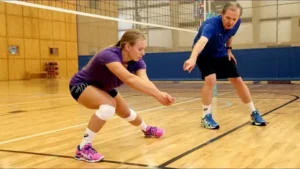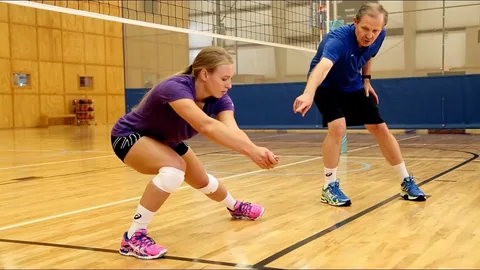Can you play volleyball in running shoes? Here’s What You Need to Know!

So, you’re all set for a game of volleyball—except you don’t have volleyball shoes. Instead, you’ve got your trusty running shoes sitting by the door. Now you’re left wondering, Can you play volleyball in running shoes? Well, the short answer is yes, but there are several important factors to consider before you step onto the court.
The right footwear can make all the difference in a sport like volleyball, where swift lateral movements, jumps, and quick stops are crucial. Let’s dive into the differences between running shoes and volleyball shoes, explore why it matters, and help you make the best choice for your feet and performance.
Related posts: volleyball shoes: Ultimate Guide to Choosing the Best Pair for Your Game
Will img academy add boys volleyball? xploring Future Possibilities for Volleyball Enthusiasts
What is the Basic Rule of Volleyball?
Why Proper Footwear Matters in Volleyball
When it comes to volleyball, the type of shoes you wear impacts not only your performance but also your safety. Volleyball involves constant lateral movements, frequent jumps, and sudden direction changes. Without the right footwear, you increase your risk of slipping, straining a muscle, or injuring your ankle.
Choosing proper volleyball shoes can help protect against injuries specific to the sport by providing the necessary traction, support, and stability that running shoes might lack.
Key Differences Between Running Shoes and Volleyball Shoes
Running shoes and volleyball shoes are designed with entirely different activities in mind. Here’s how they differ:
Sole Design and Traction
Running Shoes: Created for forward motion with soles that offer grip on pavement and trails.
Volleyball Shoes: Designed for better traction on indoor courts, allowing players to make quick turns without slipping.
Cushioning and Impact Absorption
Running Shoes: Feature cushioning meant to absorb repeated forward motion impact.
Volleyball Shoes: Offer specific cushioning to soften landings and protect joints from repetitive jumps.
Support and Stability
Running Shoes: Prioritize forward motion support.
Volleyball Shoes: Built with extra lateral support to handle quick side-to-side movements.
Can You Play Volleyball in Running Shoes?
Technically, yes, you can play volleyball in running shoes if that’s all you have on hand. However, it’s not ideal and can compromise both your performance and safety.
Potential Benefits of Using Running Shoes for Volleyball
Cost-Effective: If you’re a casual player, investing in specialized volleyball shoes might feel unnecessary.
Lightweight and Flexible: Running shoes are typically lightweight, which can feel comfortable during quick games.
Cons of Using Running Shoes for Volleyball
While running shoes can work in a pinch, they come with some drawbacks for volleyball:
1. Lack of Lateral Support
Running shoes are designed for forward motion, so they don’t have the necessary support for side-to-side movements. This can increase your risk of ankle twists or sprains on the court.
2. Reduced Grip on Court Surfaces
Volleyball courts can be slippery, especially if you’re sweating it out in an indoor gym. Running shoes often lack the court-specific grip volleyball shoes provide, increasing your risk of slipping.
3. Potential Impact on Performance
Running shoes aren’t built for jumping and landing, so they won’t cushion these movements as effectively, potentially affecting your overall performance.
How Running Shoes Affect Your Performance on the Court
Wearing running shoes for volleyball might not seem like a big deal at first, but here’s how it could affect your game:
Reduced Jump Height: The cushioning in running shoes can reduce the springiness you need for explosive jumps.
Decreased Agility: Running shoes don’t offer the same flexibility needed for quick, sharp turns.
Increased Risk of Slips and Falls: Running shoes are built for outdoor surfaces, not gym floors, which means you might be sliding around more than expected.
Risks of Playing Volleyball in Running Shoes
Playing volleyball in running shoes regularly could lead to injuries like:
Ankle Sprains
Knee Strain
Plantar Fasciitis
The more you use running shoes instead of proper volleyball shoes, the greater the chances of developing long-term issues, particularly with your knees and ankles.
Expert Recommendations on Volleyball Footwear
Experts agree that, while running shoes are designed for a different set of movements, they can serve in a pinch for beginners or casual players. However, investing in a pair of volleyball shoes is worth it if you’re playing regularly or want to protect yourself from potential injuries.
Features to Look for in Good Volleyball Shoes
When shopping for volleyball shoes, here’s what to keep in mind:
Enhanced Grip: Look for a sole that grips well on indoor courts.
Extra Cushioning: Find shoes with adequate padding to absorb impact from jumps.
Breathability: Playing indoors can get warm, so choose shoes made from breathable materials.
Comparing Volleyball Shoes with Other Sports Shoes
Here’s a quick look at how volleyball shoes stack up against other popular sports shoes:
Basketball Shoes: Offer good ankle support but are heavier than volleyball shoes.
Cross-Trainers: Provide some lateral support but lack volleyball-specific cushioning.
Running Shoes: Ideal for forward movement but lack stability for side-to-side movements.
What to Do if You Don’t Have Volleyball Shoes?
If volleyball shoes aren’t an option for you right now, here’s how to make the most of running shoes:
Tape or Brace Your Ankles: This can add extra support and reduce injury risk.
Use Non-Slip Insoles: They’ll help provide a bit more traction.
Limit Quick Lateral Movements: Focus on controlled movements to avoid twisting.
FAQs
Can I wear cross-training shoes for volleyball?
Yes, cross-training shoes can provide some support, but they’re not as effective as volleyball shoes.
What makes volleyball shoes different?
Volleyball shoes have enhanced grip, lateral support, and impact-absorbing cushioning designed for the sport.
Are high-top basketball shoes suitable for volleyball?
They can provide ankle support, but their weight can slow you down compared to lighter volleyball shoes.
How often should I replace volleyball shoes?
It’s best to replace them every season or after about 60-70 hours of play, depending on wear.
Is it worth buying volleyball shoes for beginners?
Yes, if you plan to play regularly, proper shoes can improve your game and prevent injury.
Conclusion
So, can you play volleyball in running shoes? Absolutely, but it’s not ideal. Running shoes don’t offer the necessary lateral support, grip, or impact absorption you need for an optimal volleyball experience. If you’re just starting or playing recreationally, running shoes can work short-term. But if you’re looking to step up your game—or protect yourself from injuries—consider investing in a pair of volleyball-specific shoes.
